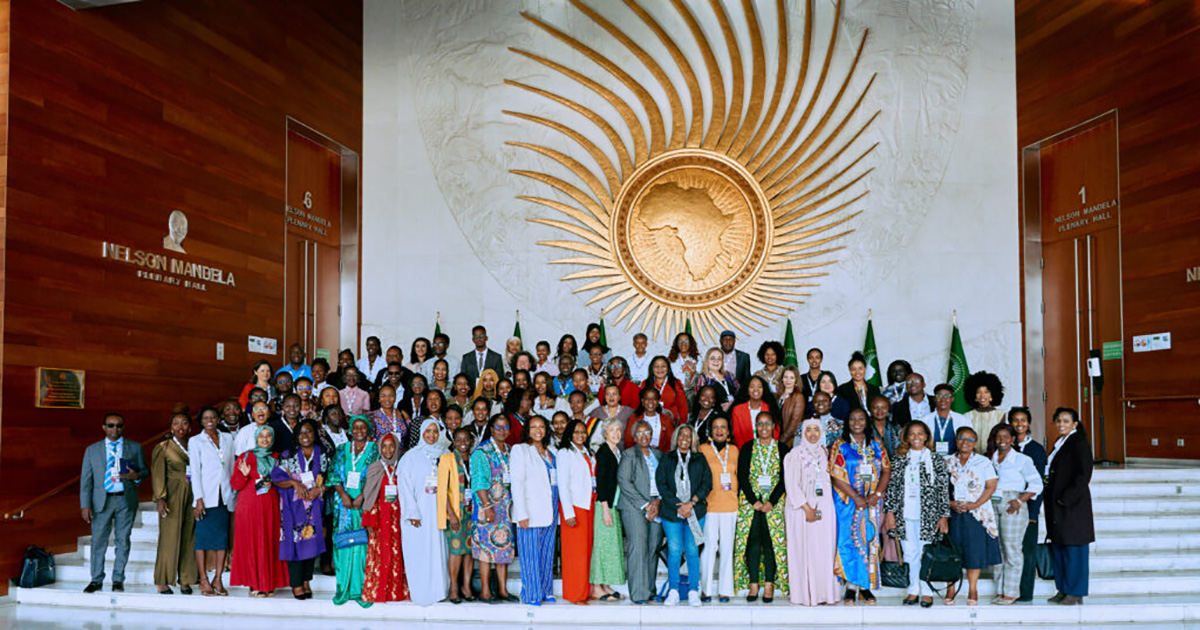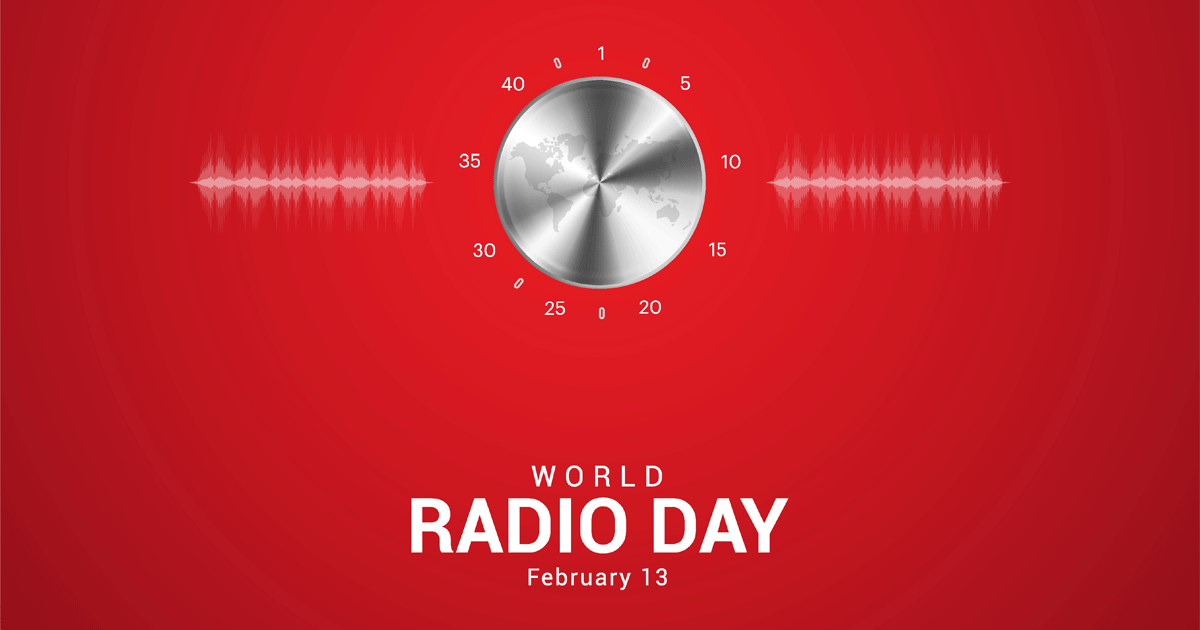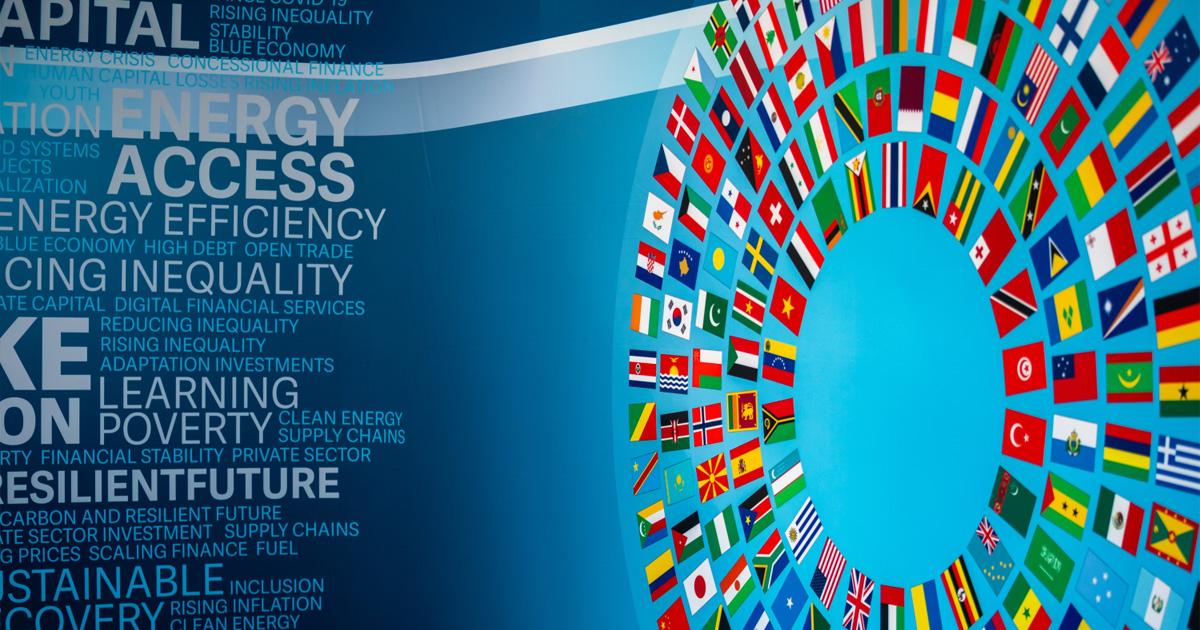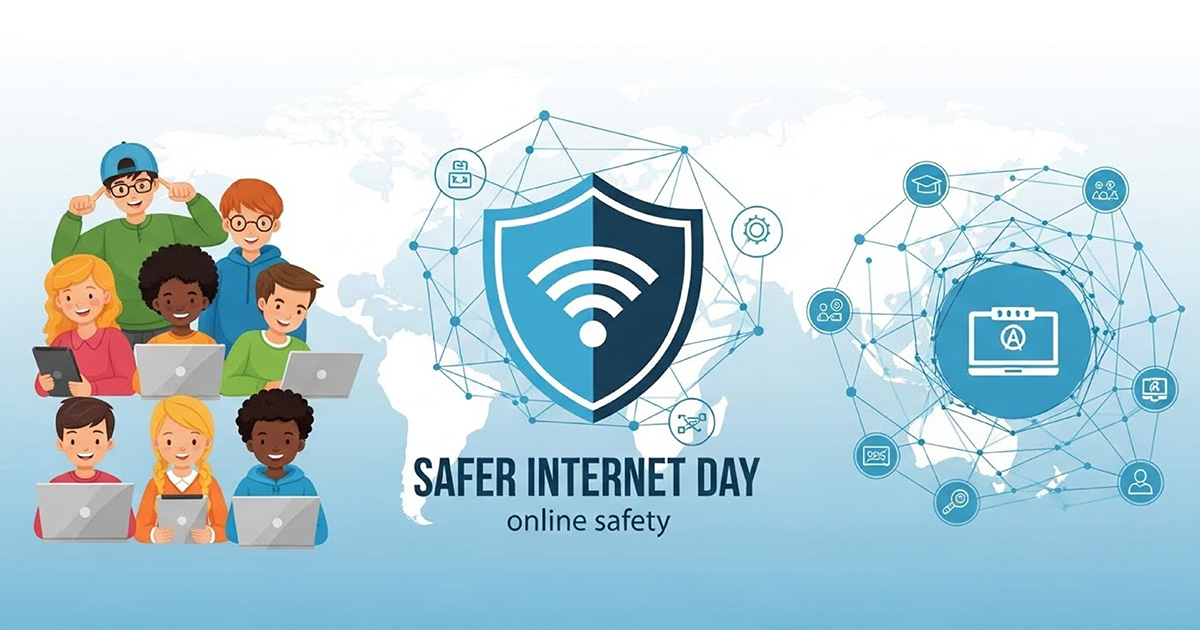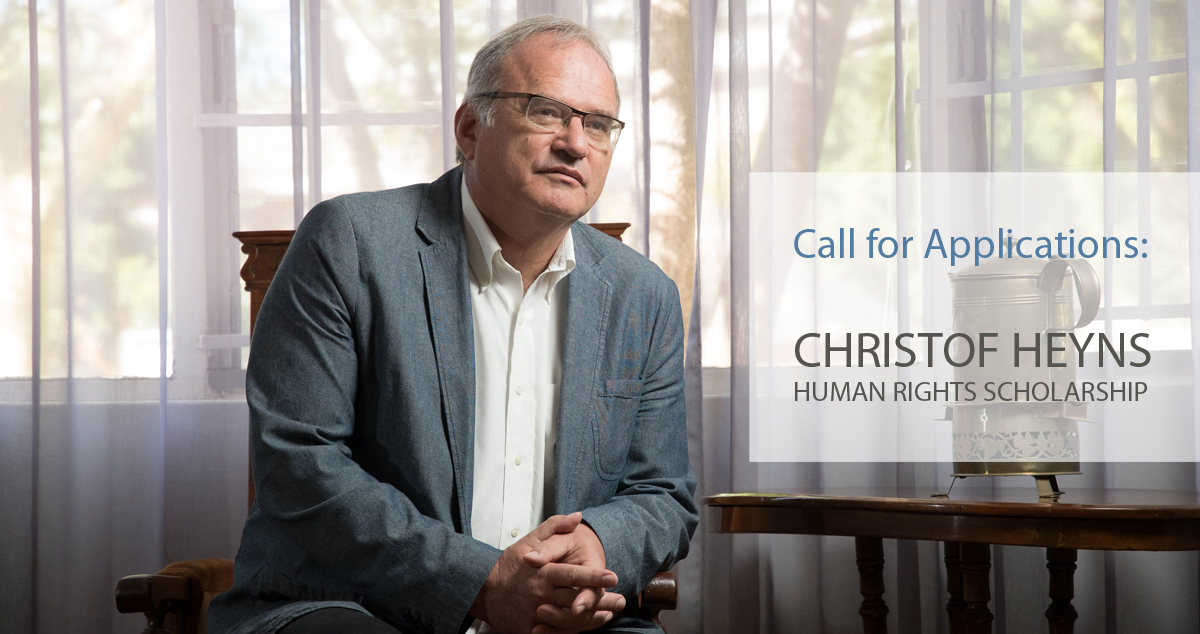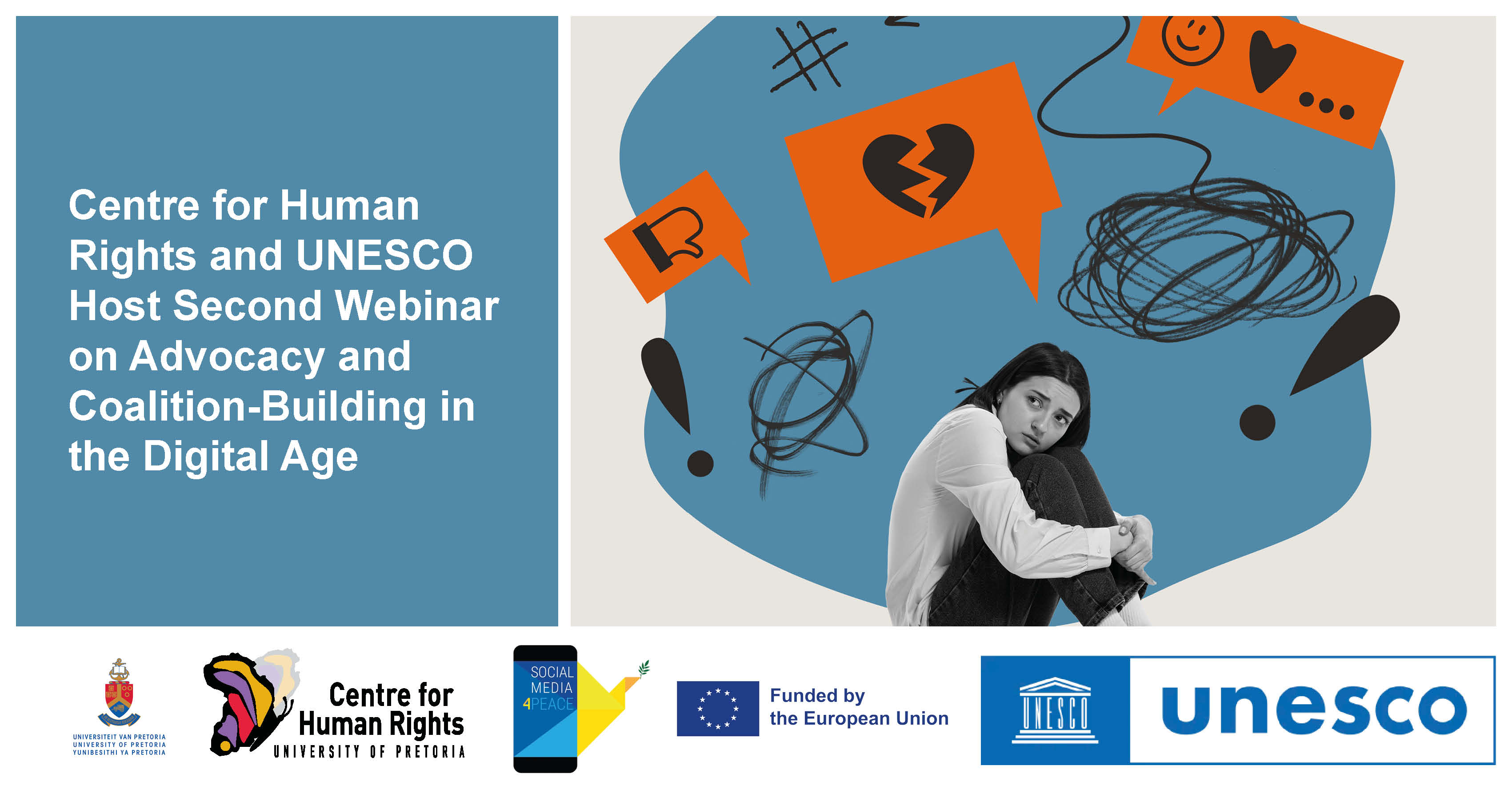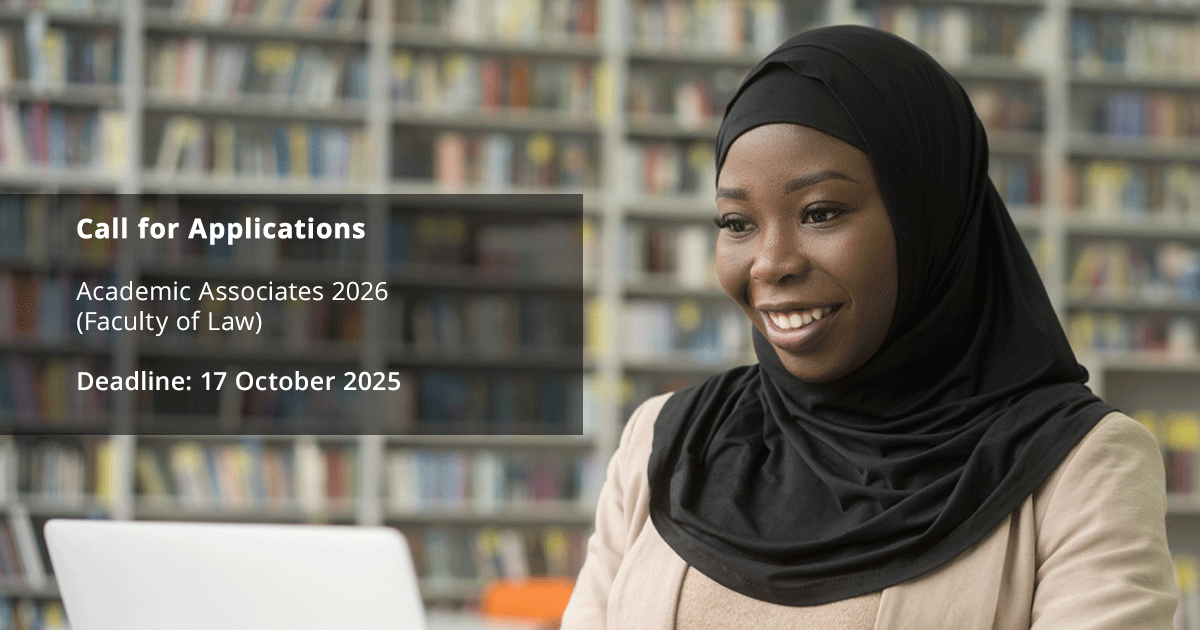- Details
The African Human Rights Law Journal (AHRLJ) and the Centre for Human Rights, University of Pretoria (Centre) are pleased to announce the publication of Volume 25, Issue 2 of the AHRLJ.
- Details
The African Court on Human and Peoples’ Rights (African Court), the African Commission on Human and Peoples’ Rights (African Commission), and the African Committee of Experts on the Rights and Welfare of the Child (African Children’s Committee) are pleased to invite submissions for fully developed articles and case discussions aiming to make ground-breaking academic-style contributions to the human rights discourse in Africa.
- Details
The Centre for Human Rights, University of Pretoria (the Centre), in collaboration with Open Society Foundation will host a webinar to launch the Democratic Republic of Congo (DRC) Elections Report titled “Proactive Disclosure of Information During Elections: An Evaluation of DRC’s Compliance with the Guidelines on Access to Information and Elections in Africa During the Harmonised Elections of 23 August 2023.” This webinar will convene voices from academia, civil society, media, youth formations and public institutions to interrogate the extent to which DRC’s electoral stakeholders complied with the Guidelines on Access to Information and Elections in Africa, adopted by the African Commission on Human and Peoples’ Rights in 2017.
- Details
The Centre for Human Rights, Faculty of Law, University of Pretoria, has officially welcomed the fourth cohort of students to its Disability Rights in Africa (DRIA) master’s programme, marking another milestone in advancing disability rights scholarship on the continent.
- Details
The Centre for Human Rights, Faculty of Law, University of Pretoria, through its Expression, Information and Digital Rights (EIDR) Unit, participated in the 2025 conference of the African Women in Media (AWiM), hosted at the African Union headquarters in Addis Ababa, Ethiopia from 4 to 5 December 2025. The conference was convened under the theme “Beyond Commitments: Advancing Policies for Gender-Safe Media”.
- Details
Today, 13th February 2026, is World Radio Day, a moment to pause and honour one of the most familiar companions of our lives.
Radio represents and advances the fundamental rights to freedom of expression and access to information. Most of us grew up with the radio. It was always there in the background of ordinary days, perhaps resting on a kitchen shelf, placed on the bedside table, balanced on a windowsill, or tucked into the corner of a small shop. It played in buses and minibuses, in taxis, tro-tros, jeepneys, dala-dalas, colectivos and matatus. It kept farmers company in the fields, vendors alert at their stalls, drivers awake on long roads, and families connected long before smartphones entered our pockets.
- Details
The Human Rights Centre at the University for Peace (UPeace) invites you to participate in a fully online training on Multilateral Development Banks’ Accountability Mechanisms from 14 -15 May 2026 at 9:00am–12:00md (GMT-6).
- Details
Are you interested in contributing to the academic and practical excellence of organising international moot court competitions?
The Centre for Human Rights, Faculty of Law, University of Pretoria, is an internationally recognised institution combining academic excellence with impactful advocacy to advance human rights, particularly in Africa. The Centre organises and coordinates leading international and regional moot court competitions – the Christof Heyns African Human Rights Moot Competition and the Nelson Mandela World Human Rights Moot Court Competition – which form a core component of its teaching, training and advocacy mandates.
The Centre invites applications for the position of Moot Court Competitions Assistant Coordinator, to start at the beginning of the 2026 academic year. This position is intended for a doctoral candidate (LLD or PhD)who will be starting his or her doctoral studies in 2026 at the University of Pretoria. The role offers a valuable opportunity to gain project management experience alongside doctoral studies.
The position will be based at the Centre for Human Rights, University of Pretoria. The successful candidate will work closely with the Moot Court Coordinator and the Centre’s academic staff to support the effective planning, preparation and execution of the Centre’s moot court activities.
- Details
The Centre for Human Rights, Faculty of Law, University of Pretoria in collaboration with the Thulani Maseko Foundation, Human Rights Watch, Amnesty International and the International Commission of Jurists invite you to the Third Thulani Maseko Memorial Lecture under the theme: ‘The role of solidarity in advancing justice and accountability for the persecution of human rights defenders in Eswatini’.
- Details
Comprehensive Sexuality Education (CSE) is central to advancing young people’s sexual and reproductive health and rights (SRHR). While Malawi has demonstrated policy commitment to CSE, persistent challenges remain in implementation and coherence.
- Details
The 10th of February 2026 marks Safer Internet Day. This year’s theme, “Smart tech, safe choices: exploring the safe and responsible use of AI” could not be more relevant for children growing up online today. In South Africa, where more than 95 % of children regularly use the internet, digital spaces are now as central to childhood as classrooms, homes and playgrounds. That transformation has created opportunities, but it has also stressed rights that our Constitution already guarantees.
- Details
By Tendai Mbanje
Citizens of Burkina Faso now endure life stripped of dignity, denied the rights to political participation, association, expression, and assembly. Under the self‑proclaimed pan‑Africanist Captain Ibrahim Traoré, the promise of liberation has curdled into repression. Once hailed as a defender of sovereignty, Traoré has become an oppressor to his own people, extinguishing freedoms and ruling through fear.
- Details
18–19 November 2025 — Gqeberha, South Africa
The Centre for Human Rights hosted a two-day Community Leadership and Human Rights Training Workshop in Gqeberha from 18 to 19 November 2025. The event brought together 37 participants, including community leaders, civil society actors, educators, healthcare workers, students, high school learners, faith-based representatives, and members of migrant and refugee communities. The workshop aimed to deepen understanding of human rights and migration, promote constructive dialogue, and strengthen social cohesion at the community level.
- Details
UN reports that more than 300 incidents of government-enforced shutdowns have been recorded in over 54 countries in just the past two years
In the 21st century, democracy is meant to thrive on transparency, participation, and the free flow of information. Yet, a new cancer is eating away at its foundations: state-sponsored internet shutdowns. Once considered rare and extreme, these digital blackouts have become disturbingly routine. UNESCO reports that more than 300 incidents of government-enforced shutdowns have been recorded in over 54 countries in just the past two years. The year 2024 was the worst on record since monitoring began in 2016, and the trend has only worsened into 2026.
- Details
By Lakshita Kanhiya, LLD Candidate, Centre for Human Rights, University of Pretoria
A silence that is becoming harder to justify
For a country that frequently presents itself as a model democracy and a defender of the rule of law, Mauritius’ prolonged silence before Africa’s principal human rights body is increasingly difficult to explain. The State’s periodic report under the African Charter on Human and Peoples’ Rights (and relevant protocols) has been due since 2024. While Mauritius prepared and submitted its 11th Periodic Report under the African Charter on Human and Peoples’ Rights covering the period from August 2020 to April 2024, it failed to appear before the African Commission on Human and Peoples’ Rights (African Commission / Commission), the treaty body mandated to supervise the implementation of the provisions of the Charter to present it and engage in constructive dialogue with the Commission, so that the Commission can provide its feedback through issuing concluding observations. Mauritius was listed on the agenda of both the 81st Ordinary Session held in November 2024 and the 85th Ordinary Session held in October 2025 in The Gambia. On both occasions, the State delegation did not show up. As 2026 begins, the question can no longer be postponed, is Mauritius ready to account for its human rights record to the African Commission, or will it once again remain absent?
- Details
This edited volume seeks to re-center the Global South as a critical site of knowledge production and praxis on disability and chronic illness. It challenges the uncritical transfer of Euro-American theoretical models that often fail to reflect the social, political, and cultural realities of people living with disabilities and chronic illnesses in developing contexts. Instead, it promotes a decolonial rethinking of disability and chronicity one that values local epistemologies, community-based resilience, and intersectional justice.
- Details
Digital transformation has emerged as one of the most significant forces reshaping governance, economic development, and social relations worldwide. Advances in artificial intelligence, cloud computing, digital platforms, and data-driven systems increasingly influence how states function, how economies integrate, and how rights are understood and protected. Both African and Asian countries are navigating complex opportunities and challenges as they adapt their regulatory frameworks to keep pace with rapid technological change.
- Details
We stand in solidarity with Birzeit University, a member university of the Global Campus of Human Rights and a founding member of the Arab regional programme in Democracy and Human Rights, with its leadership, its faculty, its staff and its students.
- Details
Applications are invited for the award of the first Christof Heyns Human Rights Scholarship. Applications are open to current or prospective doctoral candidates studying towards a doctoral degree in human rights at the University of Pretoria.
Download Call for Applications
CLOSING DATE: The last day for applying is 30 January 2026.
- Details
Uganda goes to the polls on 15 January 2026. Ugandans will elect the president, members of parliament for a five‑year term. As the date of the elections draws near, various stakeholders have argued that these polls are not a celebration of democracy, but rather a repetition of authoritarian consolidation. Despite the presence of 27 political parties and over 21 million registered voters, human rights groups have reported that the electoral environment is marred by violence, repression, and systematic human rights violations. For instance, Amnesty International and Human Rights Watch have documented widespread intimidation, arbitrary arrests, and torture of opposition supporters, underscoring that these elections mean little for ordinary citizens. What should be a moment of democratic renewal has instead become another occasion for authoritarian entrenchment, echoing the failures seen in Tanzania’s recent elections, yet another troubling example within the East African Community (EAC).
- Details
On 20 November 2025, the Centre for Human Rights (CHR), Faculty of Law, University of Pretoria, in collaboration with UNESCO, hosted the second webinar in the Social Media 4 Peace (SM4P) Phase II series. Building on the foundational discussions of the first session, this webinar focused on advocacy strategies, coalition-building and platform engagement. The virtual gathering provided a critical space for 35 participants representing civil society, academia, media and youth and women’s organisations to share expertise on navigating the complexities of digital governance. The series serves as an essential precursor to the upcoming workshop in Cape Town, designed to equip stakeholders with the necessary tools to translate research and lived experiences into actionable policy interventions.
- Details
On 13 November 2025, the Centre for Human Rights (CHR), Faculty of Law ,University of Pretoria, in partnership with UNESCO, successfully convened the first webinar of the Social Media 4 Peace (SM4P) Phase II initiative. Titled “Foundations of Content Governance and Digital Rights,” the session brought together 20 participants from academia and civil society to establish a conceptual and legal framework for addressing online harms. This inaugural session serves as a cornerstone for the project’s goal of raising awareness among global stakeholders to address harmful content while strictly safeguarding freedom of expression and access to information.
- Details
By Belinda Matore, an LLD candidate and project officer at the Centre for Human Rights, Faculty of Law, University of Pretoria
It is indisputable that the modern influencer stands as a central figure in contemporary digital life. These individuals, whether operating on TikTok, YouTube or Instagram, possess the ability to translate complex ideas into accessible stories, set cultural rhythms and command the attention of audiences who often hold a deep scepticism toward traditional institutions. We routinely measure their success by the breadth of their reach, their follower counts, their engagement rates, and their capacity to drive consumer behaviour. Yet by focusing solely on the extent of their influence, we overlook a far more critical question: who influences the influencer? The answer is not merely academic; it is profoundly relevant to the health of public discourse. The systemic forces shaping a creator’s message are, by extension, the forces shaping what millions of people see, share, believe and often fight about online. If we seek to educate the public about online harms and cultivate a more peaceful digital environment, we must first understand and, at times, strategically disrupt these powerful underlying forces.
- Details
The Facult of Law, University of Pretoria invites students interested in enrolling or who are already enrolled for LLM or LLD studies in the Faculty of Law of the University of Pretoria may apply to be appointed as Academic Associates in one of the departments in the Faculty.
- Details
The Centre for Human Rights, University of Pretoria, in partnership with the Norwegian Centre for Human Rights, University of Oslo, successfully hosted a Business and Human Rights training course from 2 to 7 June 2025. The six-day programme brought together 56 participants from 14 African countries, including academics, legal practitioners, government officials, civil society actors and business professionals.





